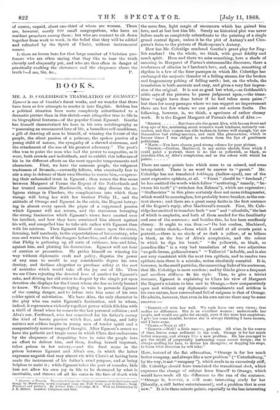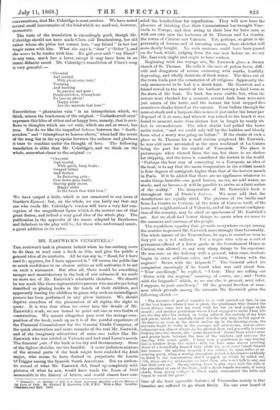BOOKS.
MR. A. D. COLERIDGE'S TRANSLATION OF EGMONT.* Egmont is one of Goethe's finest works, and we wonder that there have been so few attempts to render it into English. Seldom has a political situation been more completely subordinated to a dramatic picture than in this sketch—not altogether true to life in its biographical features—of the popular Count Egmont. Goethe has himself characterized his hero in his own autobiography as "possessing an unmeasured love of life, a boundless self-confidence, a gift of drawing all men to himself, of winning the favour of the people, the silent passion of a princess, the spoken passion of a young child of nature, the sympathy of a shrewd statesman, and the attachment of the son of his greatest adversary." The poet's idea was to paint the man who had the power to magnetize, as it were, both crowds and individuals, and to exhibit this influence of his in its different effects on the most opposite temperaments and characters. First, we have the common people, the vulgarest tradesmen of Brussels,—cowardly fellows, who eventually fear to stir a step in defence of their own liberties to rescue him,—express- ing their unbounded trust in Egmont ; then comes the fine scene between Margaret of Parma the Regent of the Netherlands and her trusted counsellor Machiavelli, where they discuss the re- ligious risings in Flanders, the complications into which these risings will bring her with her brother Philip II., and the attitude of Orange and Egmont in the crisis, the Regent betray- ing in almost every speech the pique of a suppressed passion which Egmont will not return, and the statesman betraying the strong fascination which Egmont's views have exerted over his intellect, and how they have convinced him almost against his will, and compelled him to take side rather with Egmont than with his mistress. Then Egmont himself comes upon the scene, listening, half carelessly, to the expostulations of his secretary, who sees and warns him of the dangers before him, and of the certainty that Philip is gathering up all sorts of evidence, true and false, against him, and plotting his destruction. Egmont will not hear of caution or precaution. He prides himself on winning his way without diplomatic craft and policy, disputes the power of any man to mould in any considerable degree his own destiny, and declines altogether to purchase safety at the cost of anxieties which would take all the joy out of life. Then we see Clara rejecting the devoted love of another for Egmont's sake, and driving her old suitor to despair by the simple yet open devotion she displays for the Count whom she has so lately learned to know. We have Orange trying in vain to persuade Egmont of the coming danger, and to infuse into him some of his own colder spirit of calculation. We have Alva, the only character in the play who can resist Egmont's fascination, and to whom, indeed, it represents a violently repellent power which fills him with a thrill of dread when he comes to the last personal collision ; and Alva's son, Ferdinand, who has conceived for his father's enemy the kind of heroic passion which free, and daring, and lofty natures not seldom inspire in young men of tender spirit and a comparatively narrow range of thought. After Egmont's arrest we have the pathetic and tragic scene in which Clara first endeavours by the eloquence of despairing love to raise the people into an effort to deliver him, and then, finding herself impotent, takes poison in her misery,—and the final scene in the prison between Egmont and Alva's son, in which the latter expresses anguish that may almost vie with Clara's at having been made the instrument of his father's cruel purpose, and at being helpless to resist it ; while Egmont takes the part of consoler, bids him not allow his own joy in life to be destroyed by what is inevitable, and throws off all his cares in the face of death with • Egmont: a Tragedy. Translated front the Original Uermau (with Entr'actes and Songs by Beethoven. newly arranged from the Full Score and Schubert's Song, Frrudroll and Leidrol0. By Arthur Duke Coleridge, 31.A. With an Illustration by J. E. Millais. London: Chapman and Hall.
the same free, light magic of unconcern which has gained him love, and at last lost him life. Surely an historical plot was never before made so completely subordinate to the painting of a single grand central figure, unless it be the plot of Antony's and Cleo- patra's fates to the picture of Shakespeare's Antony.
How has Mr. Coleridge rendered Goethe's great play for Eng- lish readers? On the whole, we think, with great fidelity and much spirit. Here and there we miss something, here a shade of meaning in Margaret of Parma's statesmanlike discourse, there a tenderness of allusion in Clarchen's love, and, again, something of rhythm in a few of the finer passages in which Mr. Coleridge has exchanged the majestic thunder of a falling stream for the broken and fragmentary pelting of falling earth ; but, on the whole, the
translation is both accurate and easy, and gives a very fair impres- sion of the original. It is not so good but what,—as Goldsmith's critic says of the pictures he passes judgment upon,—the trans- lator " might have done better if he had taken more pains ;"
but then for many passages where we can suggest no improvement there are but few where we can point out serious faults. The following, however, is, we think, a specimen of rather clumsy work. It is the Regent Margaret of Parma's sketch of Alva :—
"REGENT But there sits the gaunt Alva, with brazen front and deep eye of fire, muttering about woman's weak kindness, untimely con- cession, and that women can ride broken-in horses well enough, but are themselves bad riding-masters, and such like pleasantries, which in former times I was obliged to endure from the lips of gentlemen politicians. "Msett.—Yon have chosen good strong colours for your picture.
"REGENT.—Confess, Machiavel, in my entire sketch, from which I could paint a portrait, there is no tint so yellowish, so black, so jaundice-like, as Alva's complexion, and as the colour with which he
paints
There are many points here which seem to us missed, and some interpolated. There is no word to answer to " gaunt." Mr. Coleridge has not translated hohlitugig (hollow-eyed), one of the
most expressive epithets, at all. " Front " should be " forehead ;" he has omitted the words which follow "muttering," namely, "be- tween his teeth" (" zwischen den Zlihnen"), which are expressive ; " Stallmeister " in this place certainly does not mean ridingmaster, which would be meaningless, but probably horse-breaker, as the con- text shows ; and there are a great many faults in the first sentence of the Regent's reply, after Machiavel's remark. First, Mr. Cole- ridge has omitted to translate both " nur " and " allenfalls," the last of which is emphatic, and both of them needed for the familiarity and ease of the sentence ; and besides this, he has been needlessly clumsy. • It ought to run thus :—" Do but confess, Machiavel, in my entire sketch,—from which I could at all events paint a portrait,—there is no shade of so dark a yellow, of so bilious a black, as the hue of Alva's complexion, and the colour in which he dips his brush." " So yellowish, so black, so
jaundice-like" is a very bad translation of the two adjectives "so gelb-braun, gallenschwarz." " Yellowish "is feeble, and is also not very consistent with the next two epithets, and to resolve two
epithets into three is a mistake, unless absolutely essential. It is, however, in the small particles, the connecting links of his sentences, that Mr. Coleridge is most careless ; and by this he gives a frequent and needless stiffness to his style. Thus, to give a trivial instance, Egmont is explaining to Clara his view of Margaret the Regent's relation to him and to Orange,—how comparatively open and without any diplomatic concealments and artifices is his own nature, how reserved and full of enigmas is that of Orange.
He admits, however, that even in his own nature there may be some reserves :—
"Eostosr.—I wish her well. We each have our own views; that makes no difference. She is an excellent woman ; understands her people, and would see quite far enough, even if she were less suspicious. I give her some trouble, because she is always thinking I have secrets, and I have none.
" CLARA.—Nono at all ?
"FAIMONT.—Well a little reserve, perhaps. All wine, in the course of time, leaves some sediment in the cask. Orange is for her much better company, and always like a new problem. He has managed to get the credit of perpetually harbouring some secret design ; she is always spoiling his face, to divine his thoughts ; or dogging his steps, to learn what direction he will take."
Here, instead of the flat affirmation, " Orange is for her much better company, and always like a new problem " ("Unterhaltung," by the way, is not " company "), which reads to us excessively stiff, Mr. Coleridge should have translated the transitional dock, which expresses the change of subject from himself to Orange, which would have made all the difference to the run of the sentence. " Orange is, however, a still more interesting study for her [literally, a still better entertainment], and a problem that is ever new." It is in these minute points, especially in the less interesting
conversations, that Mr. Coleridge is most careless. We have noted several small inaccuracies of the kind which we need not, however, enumerate.
The taste of the translation is exceedingly good, though Mr. Coleridge should not have made Clara call Brackenburg, her old suitor whom she pities but cannot love, "my friend " in her last tragic scene with him. What she says is "dear" ("lieber"), and she means to be tender with him. No girl ever said "my friend" to any man, much less a lover, except it may have been in an ironic-didactic mood. Mr. Coleridge's translation of Clara's song is very graceful :— " Cheerful
And tearful, With phantasies vain !
Yearning And burning In passion and pain !
Death-stricken, triumphant To heaven above !
Happy alone Are the mortals that love !"
Nevertheless " phantasies vain " is an interpolation which, we think, misses the tenderness of the original. " Gedankenvoll seyn" expresses this bliss of either sad or happy love, namely, that it over- flows in thoughts which are not vain, which are sad or sweet, but true. Nor do we like the imperfect balance between the "death- stricken " and " triumphant to heaven above," when half the music of the song lies in the equipoise between the sadness and gladness it tries to combine under the thought of love. The following translation is older than Mr. Coleridge's, and we think, on the whole, somewhat closer to the original :-
"Cheerful
And tearful, With quick, busy brain ; Swayed hither And thither In fluttering pain; Cast down unto death, Soaring gaily above, Happy alone Is the heart that cloth love r
We have carped a little, which is not unnatural in any lover of Goethe's Egmont ; but, on the whole, we can fairly say that any one who reads Mr. Coleridge's version will have a very fair con- ception of the magnificent figure which is the central one of that great drama, and indeed a very good idea of the whole play. The publication in the appendix of the music adapted by Beethoven and Schubert to the play will be, for those who understand music, a great addition to its value.































 Previous page
Previous page